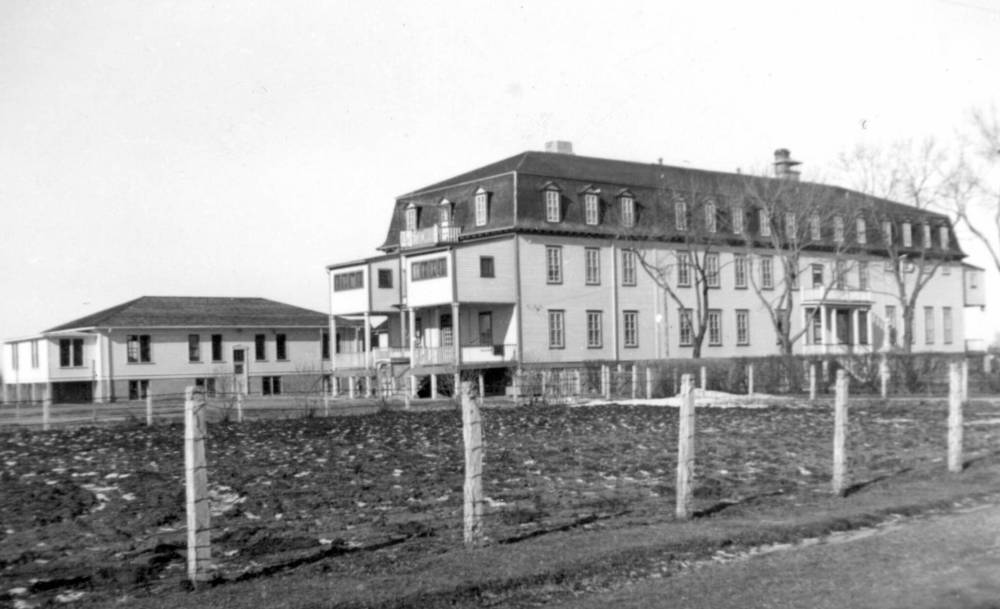Results of 10-year criminal probe into residential school abuse weeks away
Advertisement
Read this article for free:
or
Already have an account? Log in here »
To continue reading, please subscribe:
Monthly Digital Subscription
$0 for the first 4 weeks*
- Enjoy unlimited reading on winnipegfreepress.com
- Read the E-Edition, our digital replica newspaper
- Access News Break, our award-winning app
- Play interactive puzzles
*No charge for 4 weeks then price increases to the regular rate of $19.00 plus GST every four weeks. Offer available to new and qualified returning subscribers only. Cancel any time.
Monthly Digital Subscription
$4.75/week*
- Enjoy unlimited reading on winnipegfreepress.com
- Read the E-Edition, our digital replica newspaper
- Access News Break, our award-winning app
- Play interactive puzzles
*Billed as $19 plus GST every four weeks. Cancel any time.
To continue reading, please subscribe:
Add Free Press access to your Brandon Sun subscription for only an additional
$1 for the first 4 weeks*
*Your next subscription payment will increase by $1.00 and you will be charged $16.99 plus GST for four weeks. After four weeks, your payment will increase to $23.99 plus GST every four weeks.
Read unlimited articles for free today:
or
Already have an account? Log in here »
Hey there, time traveller!
This article was published 19/01/2022 (1423 days ago), so information in it may no longer be current.
SAGKEENG First Nation will soon learn whether anyone will be criminally charged for abuse committed against children at the Fort Alexander Indian Residential School.
The decision will come 52 years after the school shut its doors, 12 years after the criminal probe began and roughly two years after the investigative file was sent to Crown attorneys for review.
Members of the Manitoba RCMP major crimes unit began investigating historic allegations of physical and sexual abuse at the former residential school in February 2010.

The investigation was long and sprawling, involving 80 police officers speaking to more than 700 people across North America. It was finalized in February 2020 when the Mounties sent the case file to Manitoba Prosecution Services for review.
Roughly two years after receiving the file, a spokesperson for Manitoba Justice says Crown attorneys are finalizing their review and a charging decision is “expected in the coming weeks.”
Sagkeeng First Nation Chief Derrick Henderson told the Free Press he has been left in the dark on the case.
“They haven’t been in touch with me. I’ve just been kind of wondering what’s going on… I know they take their time with a lot of situations,” Henderson said.
“It’s something that’s kind of expected from our people now… We’re just kind of waiting. It’s a wait and see game all the time. It’s unfortunate, but that’s the way the system is.”
The existence of the RCMP probe came to light during a Free Press investigation into the Fort Alexander Indian Residential School in July 2021.
The Free Press spoke with two survivors who said widespread sexual abuse of students was an open secret at the school.
The investigation began in February 2010 with members of the RCMP major crimes unit travelling to Sagkeeng for “probative” inquiries, which included canvassing for alleged victims and witnesses.
Investigators later travelled to Ottawa for archival materials, collecting thousands of documents, including “student lists, employee lists and quarterly returns.”
A formal criminal investigation was launched in 2011.
The Fort Alexander Indian Residential School operated on Sagkeeng First Nation, located 120 kilometres northeast of Winnipeg, from 1905 to 1970.
It was one of 14 residential schools in Manitoba officially recognized by the Truth and Reconciliation Commission. The school was run by a Catholic religious order called the Missionary Oblates of Mary Immaculate.
Public revelations of abuse at the school first came to light during a historic 1990 interview that Phil Fontaine, then-Chief of the Assembly of Manitoba Chiefs, gave to the CBC.
During the interview, Fontaine revealed that he’d been victimized while a student at the school. All told, children from 21 communities attended the Fort Alexander Indian Residential School.
No former staff have ever faced criminal charges. The RCMP said the criminal investigation into the Fort Alexander Indian Residential School is the only such probe underway in Manitoba.
In August, the Canadian Press reported that three other criminal investigations into former residential schools were in progress in Ontario, Saskatchewan and the Yukon.
In 2021, Canada underwent a reckoning over its history of residential schools after ground-penetrating radar searches turned up the presumed unmarked graves of 215 children at the site of a former school in Kamloops, B.C.
The grim discovery sparked other communities to begin searching for unmarked graves at former residential schools sites, including in Cowessess First Nation in Saskatchewan, where the presumed unmarked graves of 751 people were found.
In July, Sagkeeng began ground searches near the site of the Fort Alexander Indian Residential School, as oral history in the community had long indicated there were likely unmarked graves.
Henderson told the Free Press the ground searches had to be temporarily suspended due to rising COVID-19 case counts, but would begin again in early February.
ryan.thorpe@freepress.mb.ca
Twitter: rk_thorpe

Ryan Thorpe likes the pace of daily news, the feeling of a broadsheet in his hands and the stress of never-ending deadlines hanging over his head.
Our newsroom depends on a growing audience of readers to power our journalism. If you are not a paid reader, please consider becoming a subscriber.
Our newsroom depends on its audience of readers to power our journalism. Thank you for your support.
History
Updated on Wednesday, January 19, 2022 1:55 PM CST: Corrects reference to remains in unmarked graves



